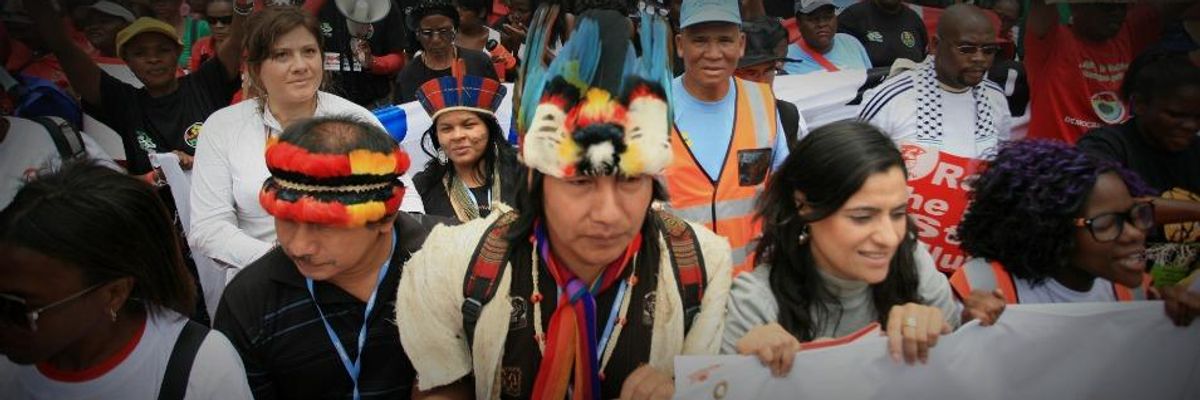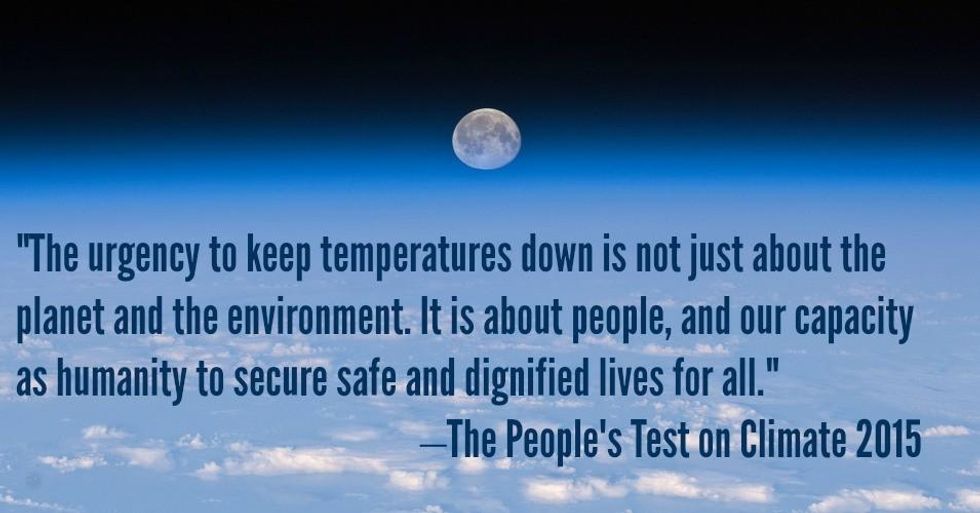"Nothing less than a systemic transformation of our societies, our economies, and our world will suffice to solve the climate crisis and close the ever-increasing inequality gap."
That is the key message of a new document--titled The People's Test on Climate 2015--endorsed by an unprecedented coalition of civil society organizations from around the world and sent Friday to world leaders ahead of United Nations climate talks next week and the widely-anticipated UNFCCC's Conference of the Parties in Paris (COP21) at the end of the year.
"Paris will be the moment that demonstrates that delivering concrete actions for the global transformation will come from people and not our politicians." The intent of the new document--shared in advance with Common Dreams and signed by thirteen leaders representing social movements of climate-impacted communities from the global South as well as faith, labor, environmental, and anti-poverty groups representing tens of millions of members from around the world--is to make it "as crystal clear as possible" to the leaders of world governments what the global climate justice movement is demanding in the lead-up to Paris, as well as its expectations for the resulting agreement.
"The scale of transformation the world needs to address the climate crisis, as well as the urgency with which this transformation must happen, is huge," the signatories to the document state in a cover letter.
And given the need for bold and immediate action, the coalition says its aim is to use its collective power to combat the relative inaction of political leaders who have been slow to acknowledge the extent of the crisis and have so far refused to make adequate commitments to meet the challenge in a "sufficient or equitable" way--even as the Paris talks rapidly approach.
The thirteen groups which endorsed the document--including Friends of the Earth-International, the Mesoamerican Campaign for Climate Justice, the International Trade Union Confederation, ActionAid, Oxfam International, and 350.org--say the vision it contains can rightly be viewed as a "litmus test" by which the final agreement should be judged. And though specifically addressed to just three individuals--the president of the UN General Assembly, the president of the previous COP20 climate talks in Peru, and the upcoming COP21 in France--the message from the coalition is targeted at all governments that will be negotiating the new climate agreement.
Shared Global Struggle, Joint Visionary Solutions
"This joint statement is a clarion call for justice and sends a clear message to political leaders that we will not accept empty promises in Paris. It's a powerful moral and political demand for people power." --Asad Rehman, Friends of the Earth
According to Asad Rehman, international climate coordinator for Friends of the Earth-UK, the vision articulated in this new document offers a ground-breaking reflection of the breadth and diversity of the groups which now make up the global climate justice movement. Moreover, the vision it contains shows the broad support the idea of a so-called "just transition" is having in both the wealthiest nations and those in the poorest and least-developed regions.
"All around the world we are seeing the effects of the climate crisis," Rehman told Common Dreams. "But all around the world we are seeing an unprecedented movement of people calling for urgent and concrete action to protect people and our planet. This joint statement is a clarion call for justice and sends a clear message to political leaders that we will not accept empty promises in Paris. It's a powerful moral and political demand for people power."
As The People's Test itself reads: "All our struggles for justice around the world--for equality, the right to food, economic fairness, human rights, decent work, environmental protection and more - are interconnected and all are tied up in the struggle against runaway climate change. All of our organizations are already working to achieve different aspects of the desperately needed global transformation. As such, we will hold you and all governments accountable not only to the policy outcome in Paris, but also to your national and regional policies and to the actual needs of people and the planet."
Jamie Henn, communications director for 350.org, said the creation of the visionary document was driven by social movements in the global South, but that all the signatories endorse the idea that social equity and justice is indivisible from the issue of global warming. "Grassroots groups in the South have been working on these principles for decades," Henn told Common Dreams. "It's good to see the rest of the environmental movement catching up with the idea that truly addressing climate change will require more than incremental shifts, but a real attention to the root causes of the crisis."
Coming off previous UN talks deemed as failures, with the most notable disaster occurring in 2009 after the COP19 collapsed dramatically in Copenhagen, the climate movement has struggled with the cyclical hype of meetings that produce lofty rhetoric but little-to-no tangible or meaningful progress.
However, Henn said things have changed in recent years. "There's been a sea change since Copenhagen in how the broader movement thinks about solving this problem," he said. "Back in 2009, most groups were talking about how to cut emissions by some percentage by some distant date. Now, we're talking about keeping fossil fuels in the ground today and fundamentally transforming our economy so we can provide 100 percent renewable energy for 100 percent of people. We're much more real, much more bold, and much more determined to make it happen."
"We're talking about keeping fossil fuels in the ground and fundamentally transforming our economy so we can provide 100% renewable energy for 100% of people."
--Jamie Henn, 350.org
Paris... and Beyond Paris
Citing the heavy influence of elite interests and corporations that stand to lose from the kind of urgent climate action that's needed, the coalition acknowledges that whatever deal emerges from Paris is unlikely to put the world on track to limit temperature increases this century to the 2degC limit already agreed to by governments, much less the 1.5degC target that climate scientists and experts say is necessary.
Despite that, the purpose of the statement is to clarify a shared vision for such an agreement. "The urgency to keep temperatures down is not just about the planet and the environment. It is about people, and our capacity as humanity to secure safe and dignified lives for all," the document declares. "Peoples' demands and solutions are based in our vision of the world that recognizes the need to live in harmony with nature, and to guarantee the fulfillment of human rights for all, including those of Indigenous Peoples, women, youth and workers."
Though not limited to these, the coalition says a just and meaningful global climate accord must entail:
- A sustainable energy transformation--redirecting finance from dirty energy to clean, affordable, reliable and safe renewable energy, supporting peoples' solutions including decentralized community renewable energy systems, banning new dirty energy projects, ensuring that access to clean, affordable, reliable and safe renewable energy is a public good, reducing energy consumption particularly by wealthy elites, and ensuring that reducing poverty and achieving justice is prioritized throughout the transformation;
- The right to food and water--ensuring people's access to water and to land for climate resilient food production, stopping land grabs and the ongoing conversion of land from food to commodities like biofuels that are falsely presented as solutions to the climate crisis, and supporting sustainable agroecology and climate resilient food production systems;
- Justice for impacted people--securing and building the resilience of impacted people including reparations for the world's impoverished and marginalized people who have no role in causing climate change, yet whose lives and livelihoods are endangered by its effects, supporting a just transition for workers into the new environmentally sustainable and socially inclusive economy, and supporting people- and community-driven adaptation and rehabilitation solutions.
Such demands come amid a growing stack of evidence--including bold acts of direct resistance against Arctic drilling and other extreme energy projects, a recent clarion call for climate action from Pope Francis, and the continued victories being won by the fossil fuel divestment movement--that the necessary paradigm shift will ultimately come from grassroots forces, and not governments. For members of this coalition, despite their dim view of what the talks in Paris might produce, good and necessary changes, in fact, are happening.
The balance of power is changing across the world, they argue, "because people across the world are prepared to fight to protect their homes, their right to energy, their right to food, and their right to a decent job." What's key, they maintain, is mobilizing those who possess this shared vision for a better future. And in order for a global agreement to be truly be championed, the coalition says, it must:
- Catalyze immediate, urgent and drastic emission reductions - in line with what science and equity require, deliver urgent short-term actions, building towards a long-term goal that is agreed in Paris, that shift us away from dirty energy, marking the beginning of the end of fossil fuels globally, and that keep the global temperature goal in reach;
- Provide adequate support for transformation - ensure that the resources needed, such as public finance and technology transfer, are provided to support the transformation, especially in vulnerable and poor countries;
- Deliver justice for impacted people - enhance the support to adaptation in a new climate regime, ensure that there will be a separate mechanism to provide reparations for any loss and damage that goes beyond our ability to adapt, and make a firm commitment to secure workers' livelihoods and jobs through a Just Transition; and
- Focus on transformational action - ensure that renewable and efficient solutions are emphasized rather than false solutions that fail to produce the results and protection we need, such as carbon markets in land and soil, dangerous geoengineering interventions, and more.
However, the document concludes, Paris will not ultimately be about what "governments achieve--or fail to achieve."
What the global gathering will demonstrate, rather, is that delivery of the necessary "global transformation" will come from the people and not politicians who, despite whatever good intentions, remain too indebted to the status quo and beholden to the profitable interests that have placed a stranglehold on democracy and progress.
The collective statement by the coalition makes it clear that they see Paris as a "beginning rather than an end" as they called the gathering of world leaders "an opportunity to start connecting peoples' demands for justice, equality, food, jobs, and rights, and strengthen the movement in a way that will force governments to listen and act in the interests of their people and not in the vested interests of elites."
In the end, their stated message to world leaders, for both Paris and beyond, is this: We are watching you.
But their larger message--the one aimed at everyone else--appears to be something closer to this: Watch us. Join us. Come and see the more beautiful world that together we can build.

